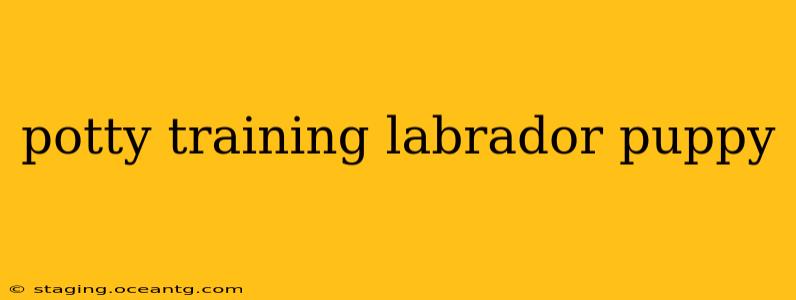Labrador Retrievers, with their playful and affectionate nature, make wonderful family companions. However, potty training a Labrador puppy can be a journey requiring patience, consistency, and a proactive approach. This comprehensive guide will equip you with the knowledge and strategies to successfully navigate this crucial stage in your puppy's development.
What is the best age to start potty training a Labrador puppy?
Ideally, you should begin potty training your Labrador puppy as soon as you bring them home, typically around 8 weeks old. At this age, they're starting to develop bladder control, and early intervention sets a strong foundation for future success. While accidents will happen, consistency from day one is key.
How long does it take to potty train a Labrador puppy?
The time it takes to fully potty train a Labrador puppy varies greatly depending on several factors: the individual puppy's temperament, your consistency in training, and the frequency of accidents. While some puppies may master it within a few weeks, others might take several months. Don't get discouraged; consistent effort is far more important than speed. Remember, patience is your greatest ally.
How often should I take my Labrador puppy outside to potty?
Frequent bathroom breaks are essential, especially during the initial stages. As a general rule, plan to take your puppy outside:
- Every 2 hours: This is particularly important for very young puppies and those who haven't yet established a consistent potty schedule.
- Immediately after waking up: Their bladders fill overnight.
- After meals: Eating stimulates bowel movements.
- After playtime: Excitement can trigger elimination.
- Before bedtime: Ensure a final bathroom break before settling down for the night.
What are some signs my Labrador puppy needs to go potty?
Recognizing your puppy's potty cues is crucial. Observe them closely for these signs:
- Circling: They may walk in circles before squatting to eliminate.
- Whining or barking: They might vocalize to express their need to go outside.
- Sniffing the ground: This indicates a search for an appropriate spot to relieve themselves.
- Sudden restlessness: They might become agitated or fidgety if they need to go.
What should I do if my Labrador puppy has an accident in the house?
Accidents will happen, and it's essential to respond calmly and effectively. Avoid punishing your puppy; this can lead to fear and anxiety, hindering the training process. Instead:
- Clean up the mess thoroughly: Use an enzymatic cleaner designed to eliminate pet odors. Your puppy’s sense of smell is far more acute than ours, and lingering scents may encourage them to repeat the behavior.
- Redirect: If you catch your puppy in the act, interrupt them with a firm "No!" and immediately take them outside to the designated potty area.
- Reward success: Praise and reward your puppy lavishly for eliminating outside. Positive reinforcement is far more effective than punishment.
What are some effective potty training techniques for Labrador puppies?
Several techniques can be employed to enhance your potty training success:
- Crate training: A crate can help your puppy learn to hold their bladder, as they naturally dislike soiling their sleeping space.
- Positive reinforcement: Reward your puppy immediately after successful elimination with treats, praise, and affection.
- Consistency: Maintain a consistent routine and schedule for potty breaks.
- Designated potty area: Choose a specific spot in your yard for your puppy to eliminate and always take them there.
- Supervision: Closely supervise your puppy, especially during the initial training period.
How can I prevent my Labrador puppy from chewing on things while potty training?
Chewing is a natural behavior for puppies, but it can be destructive. Provide plenty of appropriate chew toys and redirect your puppy's attention when they attempt to chew on inappropriate items. Manage their environment by securing items they might chew. Make sure they have plenty of engaging activities to keep them mentally stimulated to prevent boredom-related chewing.
My Labrador puppy still has accidents – what should I do?
If accidents persist despite your consistent efforts, consult your veterinarian to rule out any underlying medical conditions that might be contributing to the issue. Consider seeking professional guidance from a certified dog trainer who can assess your puppy's behavior and provide personalized strategies.
Remember, potty training takes time and patience. Celebrate every success, learn from every accident, and maintain a positive and consistent approach. With dedication and understanding, you and your Labrador puppy will soon master this important skill, strengthening your bond and enriching your lives together.
